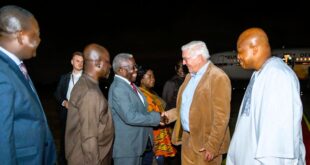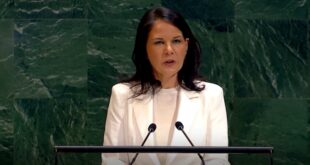President Joe Biden’s first foreign policy speech on 4 February was high on ideals but low on priorities for Africa and the developing world. It reminded me of the idealistic vision of Jimmy Carter when he came to power in 1976. Carter’s rhetoric was loaded with idealism of a world cooperating for global peace, without appreciating the limits of American diplomatic power.
Carter was soon forced to retreat from this idealism, to take a tough realpolitik stand against America’s greatest competitor, the Union of Soviet Socialist Republics (USSR). Might a similar fate befall Biden once his administration’s diplomapolitik is rejected by competitors and allies across the world?
Firstly, Biden has pursued the narrative of American diplomacy at the front of American foreign policy. It is not clear what recourse there is for the US when America’s diplomacy fails or leads to inertia. What will America do when its carrot-based incentives are moot, and it is forced to use the stick and exert force in international relations?
In addition to this, his speech was silent in regard to America supporting the use of international institutions not only to prosecute human rights abusers, but also to act as a deterrent to leaders fanning violence against the opposition and election violence during and after elections.
The recent conviction of former Lord’s Resistance Army (LRA) leader Dominic Ongwen by the International Criminal Court (ICC) shows how effective international institutions can be in pursuing justice. Not only to provide justice for innocent victims of genocide, but to act as a deterrent to authoritarian tyrants across the globe.
What will Biden’s policy be on the use of international institutions to pursue justice for victims of human rights abuses in developing countries like Kenya?
Thirdly, Biden does not state what happens when American interests clash with its values in regions like Yemen and the Horn of Africa, where Iran and Russia are locked in a struggle with the US and Saudi Arabia for control of this geo-strategically important part of the world. When American interests clash with its values, will diplomacy still lead the way, or will alternative methods be applied to maintain regional order?
From Biden’s speech, it is not clear there is an appreciation for the limits to American power in the developing world. Biden’s rebuke of the coup d’etat in Burma for instance, has little effect without the input of its main regional allies such as China, Thailand, and the Philippines.
America has condemned extrajudicial power grabs in Burma numerous times in the past with little effect. In Afghanistan, another part of South Asia, there are no specific benchmarks delineated in the speech about America’s withdrawal from that country. The Taliban have threatened to attack US troops should they stay beyond the May 1st, 2021 deadline set in the US-Taliban peace agreement.
Yet a precipitous US withdrawal will lead to renewed civil war in Afghanistan. This has major implications for security and stability in South Asia, while opening Afghanistan up as an easy base for global terror groups once the US withdraws.
Lastly, is the question of Lesbian, Gay, Bisexual, Transgender, Queer (LGBTQ) rights.
Biden ties American assistance to developing nations to their acceptance and respect for LGBTQ rights. This is an area of major potential pitfalls and backlash in Africa, Eastern Europe, Latin America, the Middle East and Asia. In many countries in these regions, there is the feeling that Washington and major Western powers are imposing alien Western norms and ideational constructions of human rights on the developing world via the LGBTQ narrative.
US advocacy and pressure for LGBTQ rights in countries like Uganda, Russia, Belarus, Turkey, and Zimbabwe have actually been counterproductive, and have been skillfully used by authoritarian leaders to repress opponents under the guise of fighting alien norms encapsulated in liberal LGBTQ narratives from the West.
Biden comes to office with a huge groundswell of international goodwill and optimism. However, his first major foreign policy speech assumes all America’s allies and opponents will be willing and enthusiastic to embrace American ideals, diplomacy, and leadership. The main question for the Biden Administration is what to do when diplomacy fails.
——-
Prof Monda teaches political science, international relations and American government at the City University of New York (York College), New York, USA. He can be contacted at dmonda1@york.cuny.edu
 THE AFRICAN COURIER. Reporting Africa and its Diaspora! The African Courier is an international magazine published in Germany to report on Africa and the Diaspora African experience. The first issue of the bimonthly magazine appeared on the newsstands on 15 February 1998. The African Courier is a communication forum for European-African political, economic and cultural exchanges, and a voice for Africa in Europe.
THE AFRICAN COURIER. Reporting Africa and its Diaspora! The African Courier is an international magazine published in Germany to report on Africa and the Diaspora African experience. The first issue of the bimonthly magazine appeared on the newsstands on 15 February 1998. The African Courier is a communication forum for European-African political, economic and cultural exchanges, and a voice for Africa in Europe.

































